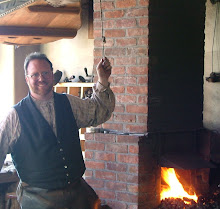What makes blacksmithing coal different from heating coal? Soft coal burns off the impurities quickly and forms “coke;” a lighter, hotter fuel than the dense and rocky anthracite. Heating coal is anthracite or hard coal. Since the smith is placing the metal to be heated in the coals, soft coal and coke work better for the job.
Coal is also referred to by the size of the pieces to which it has been reduced. “Nut coal” or “walnut” has chunks the size of walnuts. “Pea coal” is the size of dried beans or peas. “Fines” are composed of coal crushed to a coarse powder. The largest I have seen is fuel from an industrial forge. The coal chunks were rocks the size of footballs! Another term for coal used to fuel boilers is “stoker coal.” That may mean large nut size, but can also mean coal treated with waste oil to make it burn hotter. This type is also smoky and less desirable in the blacksmith shop. We use good quality nut-sized bituminous coal in the shop.
Wednesday, March 18, 2009
Subscribe to:
Post Comments (Atom)

I’m very glad to found this website because of your gift for words, I enjoyed reading them. Keep us informed like this one.
ReplyDeletewww.triciajoy.com